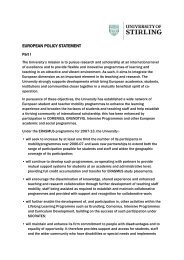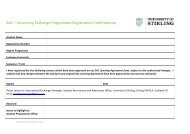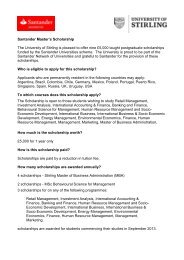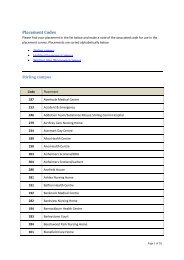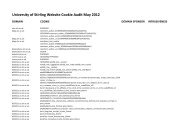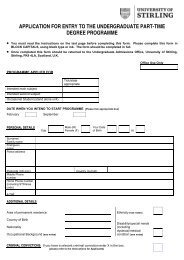Supporting a uK SucceSS Story: The impacT of - Research Councils ...
Supporting a uK SucceSS Story: The impacT of - Research Councils ...
Supporting a uK SucceSS Story: The impacT of - Research Councils ...
You also want an ePaper? Increase the reach of your titles
YUMPU automatically turns print PDFs into web optimized ePapers that Google loves.
the concentration <strong>of</strong> lactate in the blood and since the production <strong>of</strong> lactate<br />
makes the blood acidic, priming exercise can be thought <strong>of</strong> as an “acid-up”<br />
(as opposed to a “warm-up”). It is generally thought that a high concentration<br />
<strong>of</strong> lactate acid makes athletic performance worse, but the researchers have<br />
repeatedly shown that the effects <strong>of</strong> priming can actually make performance<br />
better! Specifically, it seems to enhance the body’s ability to use oxygen<br />
when the main bout <strong>of</strong> exercise is performed, and this, in turn, improves<br />
performance.<br />
Priming is, <strong>of</strong> course, a legal means <strong>of</strong> enhancing performance. It will improve<br />
performance in any event that lasts from around two minutes up to about 30<br />
minutes. In an athletics stadium, this means all events from the 800 metres to the<br />
10,000 metres could be improved by priming exercise. Many cycling and rowing<br />
events will also be improved by priming exercise. Consequently, many <strong>of</strong> the great<br />
performances in London 2012 could be achieved by an athlete “primed” by an<br />
“acid-up” developed by scientists in UK universities.<br />
Keeping hydrated<br />
Athletes dehydrate, or lose body fluid, during<br />
competitive events, even when it’s not particularly<br />
hot. Dehydration can impair both physical and<br />
mental performance and even low levels <strong>of</strong><br />
dehydration can lead to severe physiological<br />
consequences. A loss <strong>of</strong> two per cent bodyweight<br />
can cause an increase in perceived effort and is<br />
claimed to reduce performance by 10 to 20 per<br />
cent. Many motorsport events, such as those<br />
that take place in the United Arab Emirates,<br />
are held in extreme high temperatures where<br />
the concerns <strong>of</strong> dehydration and physiological<br />
function are normally associated with the sports<br />
person, while the effects <strong>of</strong> dehydration on<br />
support staff such as race marshals is <strong>of</strong>ten<br />
ignored.<br />
Dr Gareth Davison <strong>of</strong> the Sport and Exercise<br />
Sciences <strong>Research</strong> Institute at the University<br />
<strong>of</strong> Ulster in collaboration with Dr Sean<br />
Petherbridge, Chief Medical Officer <strong>of</strong> the<br />
Automobile & Touring Club <strong>of</strong> the United<br />
Arab Emirates, have received funding from<br />
the Federation Internationale de l’Automobile<br />
(FIA) Institute to examine the effects <strong>of</strong><br />
dehydration on physiologically related vital<br />
signs in motorsport marshals working in a<br />
hot and humid environment within the United<br />
Arab Emirates. A secondary aim <strong>of</strong> this work<br />
will be to provide important information that<br />
will contribute towards the production <strong>of</strong> a<br />
best practice report for motorsport marshals<br />
in extremely high temperatures. This research<br />
is due to begin shortly and will be <strong>of</strong> particular<br />
interest to athletes hoping to take part in the<br />
2016 Olympics which will be held in sunny Rio,<br />
Brazil and the FIFA World Cup in Qatar.<br />
SECTION two : Health and Wellbeing 25





